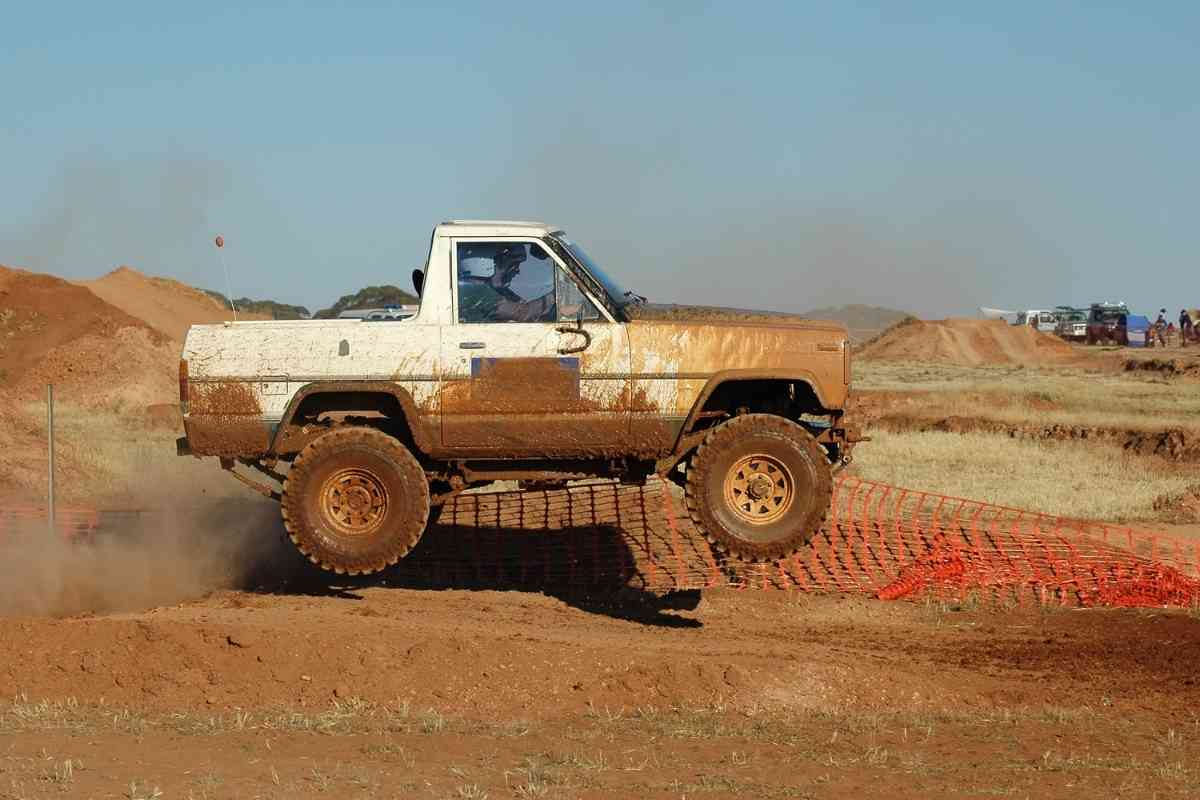How To Lift A Truck Without Voiding The Warranty
One dilemma that vehicle owners have is they find that they can void their warranty if they install a lift. So, how can you lift a truck without voiding the warranty? Before you consider installing a lift in your truck, you may want to ask yourself why you want a lift installed in the first place. Is it simply for aesthetic reasons or do you plan on using your vehicle frequently in off-road situations? Installing a lift in your truck can become quite expensive once you have purchased all the parts and paid for professional installation. On top of that, the potential to void your warranty by not using manufacturer-approved lift kits or by doing the installation yourself could lead to further costs down the road if problems should arise.

Can you lift your truck without voiding the warranty?
Although installing a lift in your truck does not automatically void your warranty, you may want to consider purchasing a manufacturer-approved lift kit for your truck and paying to have it professionally installed to increase your chances that your warranty will be valid after the installation.
Another important thing to note is that even if you install a lift kit that is not officially approved by the manufacturer for your lift kit if you have issues with other components of your vehicle that are covered under warranty, the manufacturer cannot deny your warranty claim if the issue is not a direct result of the lift kit. For example, if you are having some electrical issues with your lights or radio etc.
The warranty should still be valid for those electrical components even if you have a custom and unapproved lift kit installed.
The main point is truck manufacturers spend a small fortune when they are designing a vehicle and paying engineers to determine how much weight, stress, and strain a suspension and the vehicle’s powertrain components can take while maintaining the structural integrity and lifespan of the vehicle.
Let us take a look at some of the ways truck owners have been able to install lift kits in their vehicles without voiding the warranty as well as some surefire ways that you may instantly void the warranty that you may want to avoid.
Why do some lift kits automatically void a vehicle warranty?
Although we have determined that not every lift kit automatically voids a vehicle warranty and that there are ways to comply with the manufacturer that can allow you to have a lift kit and maintain a valid warranty, what are the reasons that some warranties get voided when a lift kit is installed?
Remember, if you do have a lift kit installed that may potentially void your vehicle’s warranty, the lift kit installation can not be used to justify warranty claim denials that have nothing to do with the lift kit. For example, if your AC unit completely goes out and it is covered under warranty but you have a lift kit installed, the manufacturer must still cover the replacement or repair of the AC unit.
So, why are truck manufacturers so against lift kits?
Lift kits can invalidate a vehicle warranty for many reasons. Here are some of those reasons in more detail.
Lift kits can expose a truck’s mechanical components to external conditions
When a truck contains a lift kit, many mechanical components, including the suspension, shocks, and other critical components, can be exposed to weather and other elements like dirt, rocks, and sand. The original design and construction of the truck most likely covered these essential components to protect them from outside elements and unnecessary wear and tear
Even a well-installed lift kit will alter the intended design and expose these once protected parts.

Lift kits installed by private owners or third-party service providers
Manufacturers absolutely hate anyone other than their certified technicians and auto mechanics working on their vehicles, especially if they are making considerable modifications like installing a lift kit. Even the most experienced mechanics can make mistakes, install faulty parts, or accidentally damage a vehicle component while they are working.
This is why most manufacturers will void a vehicle warranty if you install the lift kit yourself or you use a mechanic that does not possess an official certification from the manufacturer.
For example, if you would like to maintain your vehicle’s warranty on your GMC Sierra, it may be best to go to a GMC-certified dealer or technician and see what kind of manufacturer-approved lift kits they have and if they can install the kit and maintain compliance with the terms of the warranty.
If you simply find a lift kit online and install it yourself, which is something that you could definitely do and it may save you hundreds or thousands of dollars, there is a good chance that you will void your warranty in the process.
Lift kits alter the steering and handling of a truck
Many vehicle owners who have a lift kit installed in their trucks soon realize that they may have to relearn how to drive their vehicle after the installation is complete. Adding a lift kit changes how high you sit on the road, how your vehicle handles, and the way it feels when you are steering.
Lift kits can also raise the vehicle’s center of gravity which can make it more prone to roll-overs when taking sharp corners or turns.
Manufacturers may also be wary of lift kit installations because the lift kit changes how the vehicle was intended by engineers to be safely driven. Alterations to a truck’s steering and handling could lead to more accidents that could potentially cause damage to essential components of the vehicle.
Installing a lift kit greater than 2-inches
Some manufacturers may actually have a height threshold where if a lift kit over a certain size is installed into the vehicle, the warranty will automatically be voided.
For example, Toyota has a 2-inch limit on lift kits for their vehicles that will void the warranty on any of the parts that are affected or damaged by the lift kit or its installation.
How high can I lift my truck without voiding the warranty?
If you plan on doing quite a bit of off-roading, then a lift kit may be the best addition to your vehicle to make sure that you can handle all the tough uneven terrain while having enough ground clearance to avoid bottoming out and risking causing damage to the undercarriage and its components.
Also, maybe you would like a lift kit so you can install larger tires that can provide more surface area for increased traction, and a lift kit is necessary to allow enough space for the tires to rotate without coming into contact with the wheel well and/or fenders.
If you are looking to maintain your warranty and have a lift kit installed, there are no guaranteed ways to make this happen; however, by working directly with the manufacturer, you can increase your chances of achieving this goal.
Contact the manufacturer or dealer where you purchased your vehicle
One of the easiest ways to work toward keeping your vehicle’s warranty and having a lift kit installed is to work directly with the manufacturer or the dealer where you purchased your truck. For example, if you have a Toyota pickup truck, go directly to see a certified Toyota mechanic. If you drive a Ford truck, go to Ford. You may be able to consult with the certified technician to see what lift kits are manufacturer-approved and available for your vehicle.
Also, by having the lift kit installed by a manufacturer-certified technician, you may be able to avoid having your warranty voided because the installation was completed by yourself or through a third-party service provider.
By going this route, you are most likely going to need to pay a premium price for your lift kit and its installation, but if it gives you peace of mind knowing that your warranty will still be 100% valid, then it may be worth the extra cost. If the price is just too much to even consider, then you may have to live with the fact that if something happens to your suspension or powertrain components as a result of the lift kit and/or its installation, you will be on the hook to cover the repairs and replacement parts yourself.
If you are an avid off-road enthusiast, then this may well be worth the risk and you can go ahead and purchase and install your own lift kit for a fraction of the cost that the dealer would charge. You most likely can save yourself hundreds if not thousands of dollars by doing the installation yourself and by purchasing a lift kit through a parts dealer.
If you elect to do the installation yourself, you may want to make sure you are 100% confident you can do the work correctly
If you make any mistakes or you start the process only to find out that you need a professional to take over, then you may end up spending more money in the long run, or worst yet, causing damage to your truck that will be expensive to fix.
Choose a more modest lift
If you opt for the 6-inch monster-truck style lift kit, then there is an excellent chance that the manufacturer will void the truck’s warranty. Again, check with the manufacturer to see if they have any height restrictions on lift kits before making your purchase. By going with a more modest 1.5 or 2-inch lift, you may still be able to have a lift while keeping your vehicle’s warranty intact.
Can you lift a truck under warranty?
Yes, you can lift any truck whether it is under warranty or not. The main question is rather, will installing a lift kit on your particular truck void the warranty that it currently has? The main thing to remember is that if you install a manufacturer-approved lift that has been determined suitable for your vehicle by the manufacturer’s engineering and design team, then you have a much better chance of maintaining the full terms of your policy.
However, it also may be that you will need to have the manufacturer-approved lift kit installed by a certified manufacturer technician and/or mechanic as well.
What lift doesn’t void the warranty?
As many third-party manufactured lifts may void your vehicle’s warranty, going directly to your vehicle’s manufacturer for advice is strongly recommended
If you are looking to install a lift kit on your pickup truck, the first thing you should do is take your truck to the dealership and speak with a certified mechanic. Ask them what lift kits are manufacturer-approved and what other steps need to be taken in order to ensure you can have your lift and maintain the warranty on the vehicle.
Does Rough Country lift void warranty?
Although Rough Country is a well-respected lift kit manufacturer, installing a Rough Country lift kit on your truck may still void the warranty if they are not manufacturer-approved. Ao, before purchasing Rough Country products to install on your pickup truck, you may want to speak with the vehicle manufacturer.
That being said, Rough Country products do come with their own warranties that will give you peace of mind if you decide to install their lift kit and/or other suspension products.
So, although installing a Rough Country lift kit may void your vehicle warranty, you can use the Rough Country warranty to cover all the parts related to the suspension and lift kit and the original vehicle warranty to cover all the parts not affected by the lift kit like the AC, electrical components, lights, etc.
